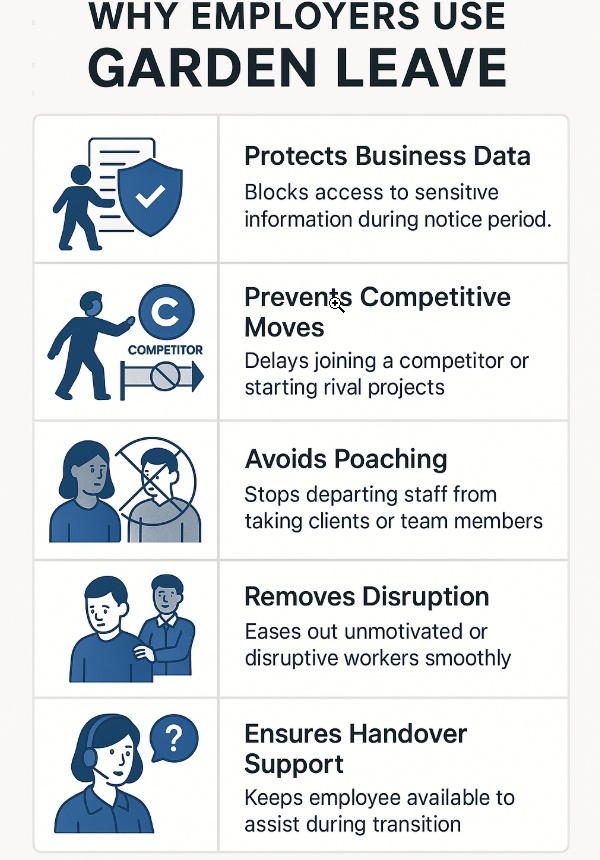Garden leave, also known as gardening leave, is a UK workplace measure that requires the quitting employee to not perform their duties in the office, at home, or another location during their notice period. Their pay and contractual benefits, however, remain unchanged. Garden leave has been extensively discussed because its benefits for the employer might not be immediately clear.
In this article, we’ll explore the pros and cons of garden leave for businesses, examining when it may be appropriate for the employer to use and when to think twice about it.
Table of Contents
Under UK law, each company decides whether to include garden leave in its employment contracts. It could be wise to consult a lawyer, as garden leave can be expensive. If the employer finds that the benefits outweigh the potential drawbacks, they must spell out the consequences of garden leave in the employment contract so both sides know what to expect going forward.
Standard terms of garden leave include:

Garden leave may be beneficial for the employer in several ways:
For some, gardening leave can be like a paid break or holiday, but for others, it may become a frustrating isolation. Being out of the industry and away from the work environment, even for a short period, comes at a cost – it impacts future career moves and limits the individual’s professional development.
Furthermore, garden leave doesn’t mean the departing employee is paid for doing nothing. As their employment contract continues in full effect, both parties are still bound by its terms. Even while employees are kept away from business processes and updates, they still have obligations to fulfil. For example, the employer may request assistance or call the employee back to the office during the notice period. For this reason, garden leave typically prohibits the employee from taking on additional or new employment unless there is the current employer’s consent.
Employers can enforce the garden leave clause only if the employment contract includes that clause in the first place. In such cases, they may refuse to fulfil an employee’s immediate resignation request or terminate their contract without serving the notice period. Its duration must be specified in the employment contract, and garden leave typically matches it. As a rule, garden leave lasts no longer than six months, although a maximum of 12 months can apply to some senior employees. Judges rarely impose it for such a long term, generally limiting it to a maximum of six months.
The employer may be able to take legal action, including seeking injunctions or damages in court, if an employee violates the terms of the garden leave agreement, such as by working for a competitor or sharing sensitive information. However, the employer will be required to prove how their business has suffered or can potentially suffer through a breach of the garden leave agreement.
Employees, in turn, may challenge garden leave if imposed unfairly — for example, if their contract does not include a garden leave clause and no written agreement was ever documented. Other grounds for challenge include withheld pay or an excessively long garden leave period.
Recent court cases have confirmed that employees have the right to work if no garden leave clause exists in their contract. For example, in William Hill v Tucker, the Court of Appeal ruled that the employee was not required to stop working, as “regular, frequent, and continuous market experience was essential for maintaining and developing professional skills for their future employment.”
While garden leave can be an effective tool to prevent potential mischief by the departing employee, employers should develop a well-structured strategy before introducing and implementing it. Here is some helpful advice to consider:
What makes garden leave different from other termination approaches?
Garden Leave vs. Non-Compete. A Non-Compete Clause is a restrictive covenant that forbids an employee from working for competitors for a certain period after leaving the job. Although the goals of both garden leave and non-compete clauses are the same—to prevent a departing employee from competing with a former employer—a garden leave clause requires the employer to keep paying the departing employee, while a Non-Compete clause does not.
Garden Leave vs. Pay in Lieu of Notice (PILON). Under PILON, the employee’s contract is terminated immediately, and they are not required to serve their notice period. Instead, they receive the pay they would have earned during that time. In contrast, garden leave keeps the employment contract active until the end of the notice period. The employee continues to receive their regular salary but is not required to perform their duties.
Garden Leave vs. Working Notice. Working notice means the employment contract is set to terminate on a future date, during which the employee continues to work, receives their regular salary and benefits, and retains full access to their usual job activities. Unlike garden leave, where the employee is wholly removed from operational processes, working notice does not protect the employer from potential information leaks or an immediate transition to a competitor.
